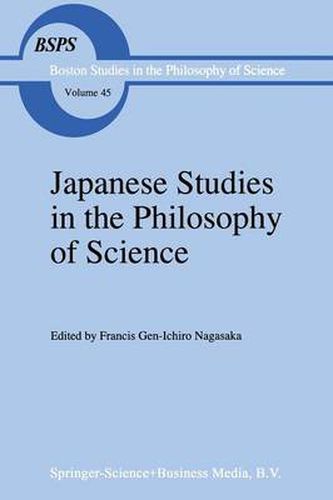Readings Newsletter
Become a Readings Member to make your shopping experience even easier.
Sign in or sign up for free!
You’re not far away from qualifying for FREE standard shipping within Australia
You’ve qualified for FREE standard shipping within Australia
The cart is loading…






This title is printed to order. This book may have been self-published. If so, we cannot guarantee the quality of the content. In the main most books will have gone through the editing process however some may not. We therefore suggest that you be aware of this before ordering this book. If in doubt check either the author or publisher’s details as we are unable to accept any returns unless they are faulty. Please contact us if you have any questions.
The splendid achievements of Japanese mathematics and natural sciences during the second half of our 20th century have been a revival, a Renaissance, of the practical sciences developed along with the turn toward Western thinking in the late 19th century. The equally admirable results of Japanese philosophers (and historians) of science in our time followed upon a period less congenial to Western interests in the philosophical questions linked to modern science; and this reluctance to confront the epistemology, not even the humane significance, of the sciences went along with devotion to other Western trends. Thus, with the ‘new’ Japan of the Meiji restoration of 1868, and the early introduction of Western philosophy in the subsequent decade by Nishi Amane, a period of intellectual attraction to utilitarian, positivist, evolutionary, even materialist outlooks was soon replaced by devotion to scholarly work on Kant and Hegel, on ethical and general philosophical idealism. These studies often could emulate the critical spirit (the philosopher Onishe Hajime, praised for his own critical independence, was known as the Japanese Kant) but the neo Kantian and neo-Hegelian developments were not much affected by either empirical sciences or theoretical speculations about Nature. The pre-eminent philosopher of Japan ofthe first half of our century was Nishida Kitaro, with a pioneering treatise A Study of the Good, who, with his leading student Tanabe Hajime, formed the ‘Kyoto School’ of pre-war philosophy.
$9.00 standard shipping within Australia
FREE standard shipping within Australia for orders over $100.00
Express & International shipping calculated at checkout
This title is printed to order. This book may have been self-published. If so, we cannot guarantee the quality of the content. In the main most books will have gone through the editing process however some may not. We therefore suggest that you be aware of this before ordering this book. If in doubt check either the author or publisher’s details as we are unable to accept any returns unless they are faulty. Please contact us if you have any questions.
The splendid achievements of Japanese mathematics and natural sciences during the second half of our 20th century have been a revival, a Renaissance, of the practical sciences developed along with the turn toward Western thinking in the late 19th century. The equally admirable results of Japanese philosophers (and historians) of science in our time followed upon a period less congenial to Western interests in the philosophical questions linked to modern science; and this reluctance to confront the epistemology, not even the humane significance, of the sciences went along with devotion to other Western trends. Thus, with the ‘new’ Japan of the Meiji restoration of 1868, and the early introduction of Western philosophy in the subsequent decade by Nishi Amane, a period of intellectual attraction to utilitarian, positivist, evolutionary, even materialist outlooks was soon replaced by devotion to scholarly work on Kant and Hegel, on ethical and general philosophical idealism. These studies often could emulate the critical spirit (the philosopher Onishe Hajime, praised for his own critical independence, was known as the Japanese Kant) but the neo Kantian and neo-Hegelian developments were not much affected by either empirical sciences or theoretical speculations about Nature. The pre-eminent philosopher of Japan ofthe first half of our century was Nishida Kitaro, with a pioneering treatise A Study of the Good, who, with his leading student Tanabe Hajime, formed the ‘Kyoto School’ of pre-war philosophy.